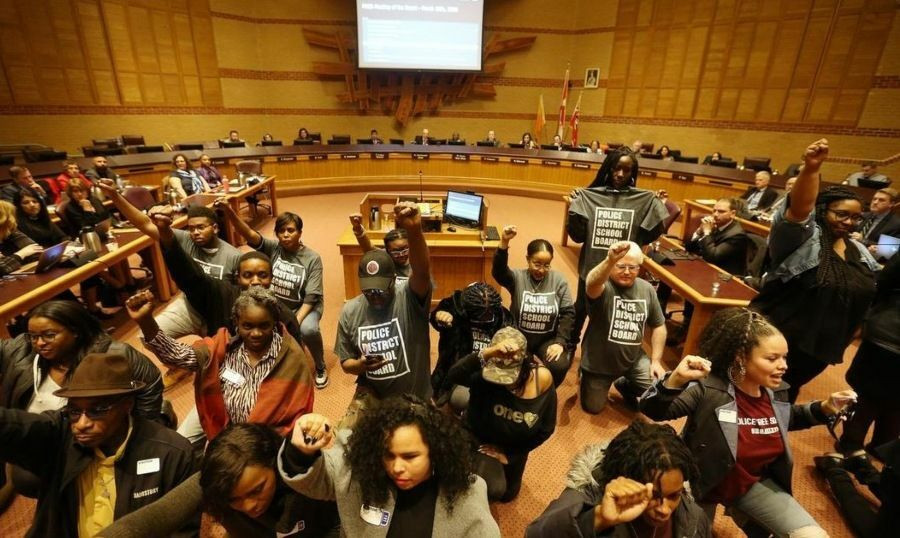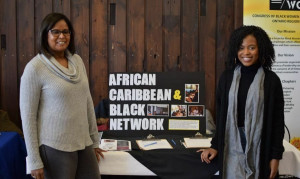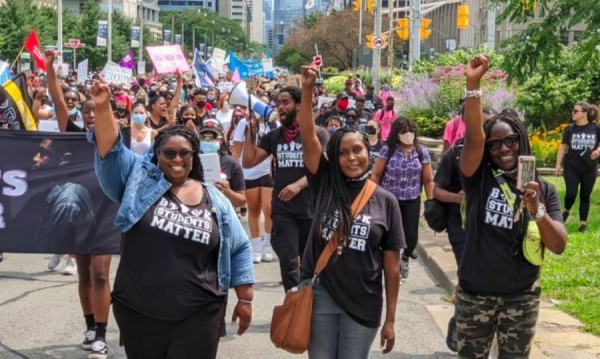Those were the only two words left for Ena Chadha, Suzanne Herbert and Shawn Richard to use in describing the astonishing litany of abuses, failures, incompetence and education malpractice inflicted on the 257 schools and 155,000 students in Peel Region.
Education Minister Stephen Lecce ordered the review, following years of parent complaints and a persistent rising tumult at each successive school board meeting. He could not have anticipated the breadth, depth and malignancy of the rot. His task now is to reverse this multi-generational malady.
The trenchant exposition, over 42 pages, leaves the reader numb, distressed, devastated. How is it possible that in the COVID-19 year of 2020, such rank unprofessionalism and outright racism is practised in our midst, countenanced by teachers, principals, superintendents and trustees, and allowed to fester and infect and spread to such deadly result.
For we are talking about life and death. Real victims. Every Black child denied the right to an education is earmarked for residency in the industrial prison complex – barring expensive backdoor intervention. Which educator doesn’t understand that? In 2020?
After hissing and spitting and groaning through the first few pages, it is page 12 that did me in. It reads:
“We met with parents of a biracial student who told us that when they attended a curriculum night at their child’s school, they were each, upon entry, given a pamphlet on school programs: the Black parent was handed a pamphlet on applied programs; the white parent received the pamphlet on academic programs. This situation is cogently illustrative of the institutionalized racism that manifests in the PDSB guidance system.”
“This is our reality. This is just how crazy it is. It’s unfathomable,” says Danielle Dowdy, a Brampton parent rep on the We Rise Together community advisory group. “Everybody focus their attention on Toronto, and everyone else across the GTA slide under the radar. Whether it’s healthcare, education or justice, all these systems work together and collectively they are stepping on Black people’s necks right across the board.”
Here is the indictment:
Indigenous, Black and gay students are all over-represented in non-university courses and under-represented in academic courses and special enriched programs. “Too many educators and administrators do not have high expectations for Black students … and they are by no means encouraged to realize their potential,” the review says. It is untenable that the PDSB is unaware of this devaluing and “mis-tracking” of Black students, the review reports. “Information gleaned from the Board’s own database discloses a prima facie case of race-based, and more particularly, anti-Black, discrimination and it must be remedied.”
One Black, “A” student reported waiting weeks for an appointment with a guidance counsellor, only to be given five minutes and told to take non-academic courses. “The PDSB guidance system must be rebuilt from the ground up to empower, as opposed to disenfranchise, Black students and parents,” says the review. Black students are “grossly over-represented in suspensions” as too many teachers and principals abandon progressive discipline and opt to remove Blacks from classes and involve police “for minor issues leading to arrests and stigmatization of Black children at a very young age.” Black stigmatization starts early.
The reviewers heard of how a cop, at an elementary school for another matter, “intervened in a situation and handcuffed a young Black elementary student. It need not be said that the result was nothing short of traumatizing for the young student and their family. Unfortunately, this incident is not isolated.”
The Ontario Human Rights Commission ruled last month that police discriminated against a Grade 1 PDSB student and “race was a factor in treatment by police when she was placed on her stomach and her wrists handcuffed behind her.”
Some teachers “use any excuse” to exclude Black students from classes. Principals have suspended Black students for wearing hoodies, hoop earrings, and do-rags. Worse, some principals remove Black kids from class, without suspension or expulsions, leaving them, as one vice-principal explained, to “spend days staring at a white wall not learning and parents never know about this de facto form of suspension.”
“Repeatedly we heard about Black students being suspended from school, some as early as junior kindergarten,” or as young as four years old, the reviewers wrote. So they asked for suspension data. PDSB suspension data list 18 reasons for a suspension, including violence, drugs, vandalism, swearing, bullying, assault and uttering threats. The 18th reason is “Other.” Strangely, in 78 per cent of secondary school suspensions, the reason listed was “Other” — “a worrisome trend” of discretionary suspensions that need explanation, the review concludes.
Between 2013 and 2019, the PDSB recorded 52 incidents of suspensions at the junior kindergarten level and 103 at the senior kindergarten level. Black secondary school students are suspended at a rate twice what their numbers would warrant. Black students told the reviewers they were often goaded into negative responses; and they experience harsher penalties and less restraint from their teachers, white and brown. Studies show Blacks, especially Black boys, are perceived to be trouble and are surveilled more closely, even when no problem behaviour is present.
The stigmatization and hurts spring from everywhere – even from the school trustees entrusted with their growth.
The report says “staff, students and families of McCrimmon Middle School and the Black communities of the PDSB deserve and are expecting an apology to address the hurt and harm” caused when Trustee Will Davies referred to the school as “McCriminal” and insisted he was only joking. Others in Peel relish other derogatory nicknames: “Ghetto Jail” and “Meadow Jail” for Meadowvale. “Central Africa” for Central Peel Secondary. One principal wanted to rename February “Fro-bruary” but was stopped by a Black colleague. And Black History Month is not universally embraced.
Reviewers heard anecdotes of racist and degrading behaviour by teachers and principals. One teacher suggested to another that a young Black elementary student “will be a drug dealer just like his dad.” One principal told a student to stop hanging around with his “monkey friends,” referencing his Black peers. The n-word is tossed around like a ball – in the hearing of teachers – and even painted on a wall at a school. Not enough is done to stop it. Parents complain, feel unheard, and have no confidence in the Board’s ability to address their concerns and educate their children. Those who can, move their kids.
Meanwhile, some staff dismiss them as whiners who are “unfairly slandering” the PDSB. There is “strenuous resistance, even at the trustee level, to anti-Black racism training” though it is obviously needed. School trustees are dysfunctional, constantly at each other’s throats, have little or no training, are clearly ill-equipped to provide oversight and are enmeshed in conflicting positions, such as pushing to get jobs and influence for favourites – nepotism gone wild. The reviewers state “grave concerns” about its ability to fulfill its legal obligations. Interactions with parents at public meetings are farcical. Senior staff seem paralyzed by the dysfunction – unable to make simple decisions, the reviewers found.
The director of education does not have a steady hand on the ship. Senior staff have little grasp of their human rights responsibilities. PDSB hiring practices are compromised, promotions manipulated to the point of lost credibility. In fact, the board’s system, designed to achieve employment equity may, in fact, be screening out targeted staff. In a school board where 83 per cent of students are racialized, staff is 67 per cent white.
PDSB is “indifferent” to factional violence amongst youths in the North Brampton Punjabi community, “seeming to think it was characteristic of that ethnic group”; and is “unresponsive” to “escalating problem of alcohol and drug abuse within the South Asian communities,” in the face of “grave concerns” from parents. PDSB secondary school student body is 24 per cent Muslim, the largest religious group. Yet reviewers heard chilling tales of “blatant hostility to the Muslim community, ignorance of basic tenets of Islam” and the “presence of White Supremacists at a meeting of the Board of Trustees.” “A good number of staff in classrooms, schools, and at the board office have substantial expertise, credentials and lived experience” to promote diversity and drive equity.
Historical data and studies show anti-Black racism is pervasive, stubborn and deadly for its victims. For many Black people, these destructive claws are first exposed at school, the very place where the child’s bright future is enshrined to begin. Short of strenuous parental intervention and watchfulness, community activism and vigilance, too many Black children find themselves shoved into the “school to prison pipeline.”
That is what’s at stake in Peel Region. And York. And Durham. It’s what Toronto’s school board faced and wrestled for decades, while its neighbours seemed to have learned little.
The PDSB has good teachers and principals, maybe in the majority. They must stand up and relentlessly challenge anti-Black racism and other human rights violations.
Exasperated, the reviewers wrote:
“There appeared to be a consistent failure to recognize that Black children are their children too. Astonishingly, there has been a historical, collective absence of a call to action to stop the harmful effects of anti-Black racism and to take responsibility for the poor outcomes of too many of our Black children.”
Minister Lecce, your move.
Royson James is a former Star reporter and a freelance contributing columnist based in Toronto. Follow him on Twitter: @roysonjames
(This article originally appeared in The Toronto Star)

 By Royson James
By Royson James 








